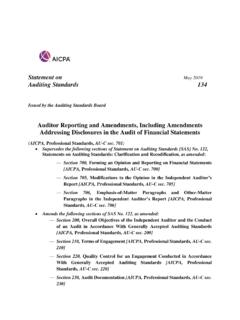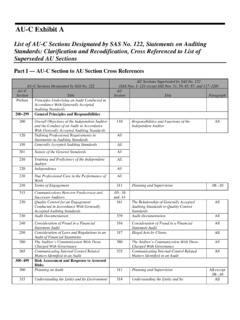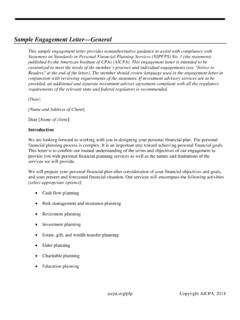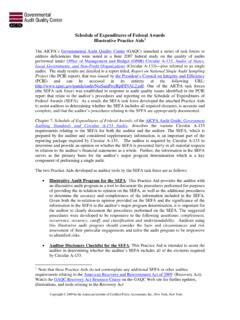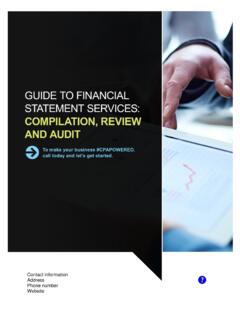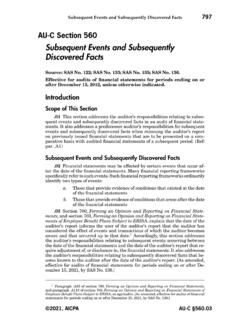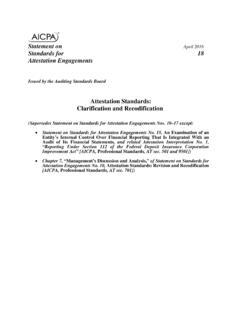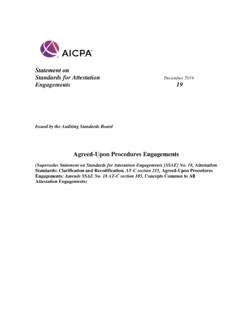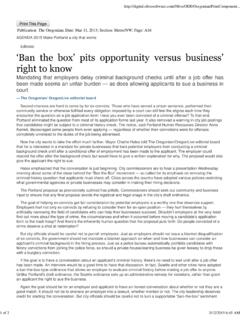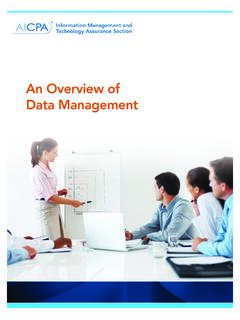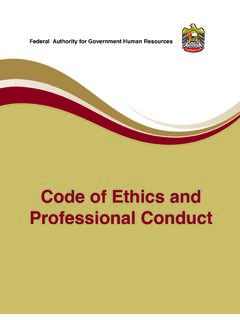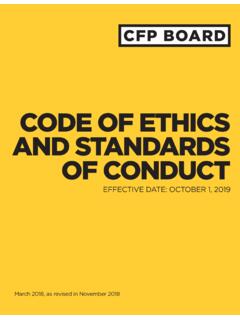Transcription of Professional Conduct AICPA Code of
1 Copyright 2016, American Institute of Certified Public Accountants, Inc. All Rights code ofProfessional ConductEffective December 15, for all Official Releases through August 31, 2016iiTable of ContentsPreface: Applicable to All Members .. Overview of the code of Professional Conduct .. Principles and Rules of Conduct .. Interpretations and Other Guidance .. Structure and Application of the AICPA code .. Structure of the AICPA code .. Application of the AICPA code .. Citations .. Transition Provisions .. Drafting Conventions .. Principles of Professional Conduct .. Preamble .. Responsibilities .. The Public Interest .. Integrity .. Objectivity and Independence .. Due Care .. Scope and Nature of Services .. Definitions .. 13 AICPA code of Professional .. Nonauthoritative Guidance .. New, Revised, and Pending Interpretations and Other Guidance.
2 New and Revised Interpretations and Other Guidance .. Pending Interpretations and Other Guidance .. Deleted Interpretations and Other Guidance .. 19 Part 1 .. Introduction .. Conceptual Framework for Members in Public Practice .. Ethical Conflicts .. Integrity and Objectivity .. Integrity and Objectivity Rule .. 29 Interpretations Under the Integrity and Objectivity Rule .. Independence .. Independence Rule .. 38 Interpretations Under the Independence Rule .. General Standards .. General Standards Rule .. 105 Interpretations Under the General Standards Rule .. Compliance With Standards .. Compliance With Standards Rule .. 107 Interpretations Under the Compliance with Standards Rule .. Accounting Principles .. Accounting Principles Rule .. 107 Interpretations Under the Accounting Standards Rule .. Acts Discreditable.
3 Acts Discreditable Rule .. 110 Interpretations Under the Acts Discreditable Rule .. 110 AICPA code of Professional Fees and Other Types of Remuneration .. Unpaid Fees .. Contingent Fees .. Commissions and Referral Fees .. Advertising and Other Forms of Solicitation .. Advertising and Other Forms of Solicitation Rule .. 123 Interpretations Under the Advertising and Other Forms of Solicitation Rule .. Confidential Information .. Confidential Client Information Rule .. 124 Interpretations Under the Confidential Client Information Rule .. Form of Organization and Name .. Form of Organization and Name Rule .. 129 Interpretations Under the Form of Organization and Name Rule .. 129 Part 2 .. Introduction .. Conceptual Framework for Members in Business .. Ethical Conflicts .. Integrity and Objectivity .. Integrity and Objectivity Rule.
4 138 Interpretations Under the Integrity and Objectivity Rule .. General Standards .. General Standards Rule .. 144 Interpretations Under the General Standards Rule .. Compliance With Standards .. Compliance With Standards Rule .. 145 Interpretations Under the Compliance with Standards Rule .. Accounting Principles .. Accounting Principles Rule .. 146 Interpretations Under the Accounting Principles Rule .. Acts Discreditable .. Acts Discreditable Rule .. 148 Interpretations Under the Acts Discreditable Rule .. 148 Part 3 .. Introduction .. Applicability .. Acts Discreditable .. Acts Discreditable Rule .. 152 Interpretations Under the Acts Discreditable Rule .. 152 Appendix A .. 155 .. 155 Appendix B .. 159 .. 159 Appendix C .. 161 .. 161 Appendix D .. 164 .. 1641 Preface: Applicable to All Overview of the code of Professional AICPA code of Professional Conduct (the code ) begins with this preface, which applies to all membersThe term member, when used in part 1 of the code , applies to and means a member in public practice;when used in part 2 of the code , applies to and means a member in business; and when used in part 3 ofthe code , applies to and means all other members, such as those members who are retired or member may have multiple roles, such as a member in business and a member in public practice.
5 In suchcircumstances, the member should consult all applicable parts of the code and apply the most restrictiveprovisions. [No prior reference: new content]Effective December 15, Principles and Rules of AICPA membership adopted the code of Professional Conduct (the code ) to provide guidanceand rules to all members in the performance of their Professional responsibilities. The code consists ofprinciples and rules as well as interpretations and other guidance which are discussed in principles provide the framework for the rules that govern the performance of their AICPA bylaws require that members adhere to the rules of the code . Compliance with the rulesdepends primarily on members understanding and voluntary actions; secondarily on reinforcement bypeers and public opinion; and ultimately on disciplinary proceedings, when necessary, against memberswho fail to comply with the rules.
6 Members must be prepared to justify departures from these Interpretations and Other of the rules of Conduct are adopted after exposure to the membership, state societies, stateboards, and other interested parties. The interpretations of the rules of Conduct , Definitions [ ], Application of the AICPA code [ ], and Citations [ ], provide guidelines about thescope and application of the rules but are not intended to limit such scope or application. A member whodeparts from the interpretations shall have the burden of justifying such departure in any disciplinaryhearing. Interpretations that existed before the adoption of the code on January 12, 1988, will remain ineffect until further action is deemed necessary by the appropriate senior member should also consult the following, if applicable: The ethical requirements of the member s state CPA society and authoritative regulatory bodies suchas state board(s) of accountancy The Securities and Exchange Commission (SEC) The Public Company Accounting Oversight Board (PCAOB) The Government Accountability Office (GAO) The Department of Labor (DOL) Federal, state and local taxing authoritiesPreface: Applicable to All Members2 Any other body that regulates a member who performs Professional services for an entity when themember or entity is subject to the rules and regulations of such regulatory body.
7 [Prior reference:Introduction] Structure and Application of the AICPA Structure of the AICPA variety of topics appear in parts 1 3 of the code . When applicable, topics are aligned with the relevantrule or rules of Conduct . Topics may be further divided into subtopics, and some subtopics include oneor more sections. Topics, subtopics, and sections interpret the rules of Conduct (see Interpretations andOther Guidance [ ])..02 Defined terms (see Definitions [ ]) as well as the plurals and possessives thereof, are shown in italicsthroughout the code . When a defined term is used in the code but is not shown in italics, the definition should not be applied. [No prior reference: new content]Effective December 15, Application of the AICPA code of Professional Conduct (the code ) was originally adopted on January 12, 1988, andwas periodically revised through June 1, 2014. On June 1, 2014, the AICPA issued a codificationof the code s principles, rules, interpretations and rulings (revised code ).
8 The revised code will beeffective December 15, 2014, excluding the Conceptual Framework sections. These sections, ConceptualFramework for Members in Public Practice [ ] and Conceptual Framework for Members inBusiness [ ], will be effective December 15, 2015. Members are permitted to implement therevised code prior to December 15, 2014, but a member may not implement the relevant ConceptualFramework prior to implementing the entire revised code . Revisions made subsequent to June 1, 2014, areidentified in appendix C, the Revision History Table, which notes the month and year of the change, theeffective date of the change, the purpose for the revision, and when possible, a link to the marked revisionof the content that appeared in the Journal of Accountancy. If the interpretation or paragraph does notcontain a specific effective date or a reference to the revision history table, then the content was effectiveprior to June 1, 2014.
9 [No prior reference: new content.].02 When used in the preface of the code , the term member includes members, associate members, and affiliatemembers, as well as international associates of the rules of Conduct apply to all Professional services performed, excepta. when the wording of the rule indicates that a member who is practicing outside the United States will not be considered in violationof a particular rule for departing from any of the rules stated herein, as long as the member sconduct is in accordance with the rules of the organized accounting profession in the country inwhich he or she is practicing. However, when a member is associated with financial statementsunder circumstances that would lead the reader to assume that practices of the United States werefollowed, the member must comply with the Compliance With Standards Rule [ formembers in public practice and for members in business] and the Accounting PrinciplesRule [ for members in public practice and for members in business].
10 C. that a member who is a member of a group engagement team (see the clarified Statement on AuditingStandards Special Considerations Audits of Group Financial Statements [Including the Work ofComponent Auditors] [ AICPA , Professional Standards, AU-C sec. 600]) will not be considered inPreface: Applicable to All Members3violation of a particular rule if a foreign component auditor (accountant) departed from any of therules stated herein with respect to the audit or review of group financial statements or other attestengagement, as long as the foreign component auditor s (accountant s) Conduct , at a minimum, isin accordance with the ethics and independence requirements set forth in the International EthicsStandards Board for Accountants (IESBA s) code of Ethics for Professional Accountants, and themembers of the group engagement team are in compliance with the rules stated that the independence of the member s firm will not be considered impaired if another firm or entitylocated outside the United States that is within the member firm s network departed from any of therules stated herein, as long as the other firm or entity s Conduct , at a minimum, is in accordance withthe independence requirements set forth in the IESBA s code of Ethics for Professional member shall not knowingly permit a person whom the member has the authority or capacity to controlto carry out on his or her behalf, either with or without compensation, acts that, if carried out by themember, would place the member in violation of the rules.
